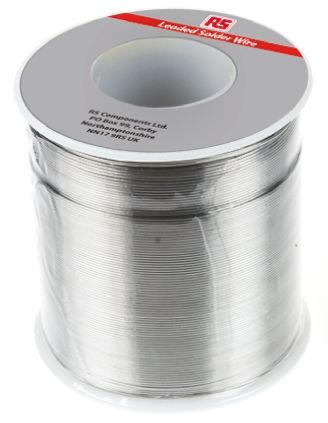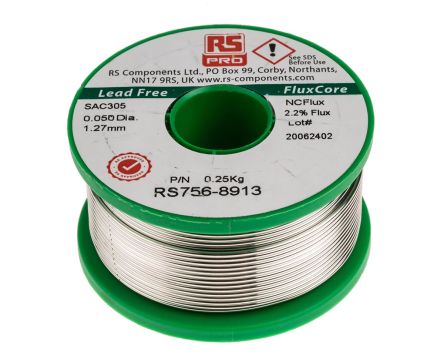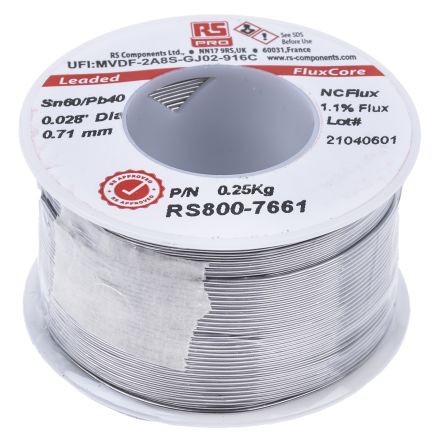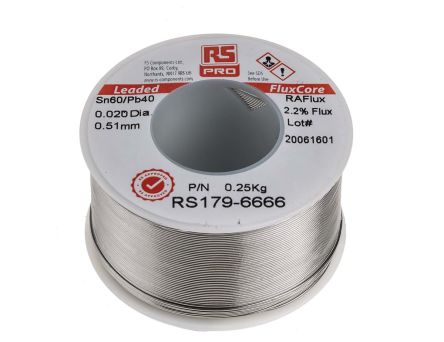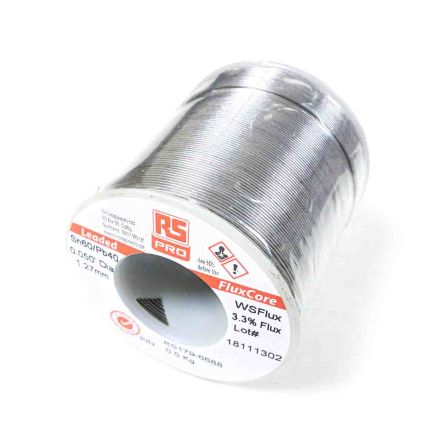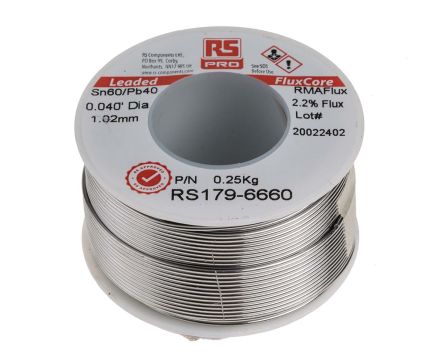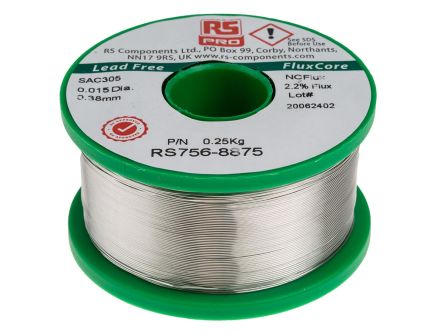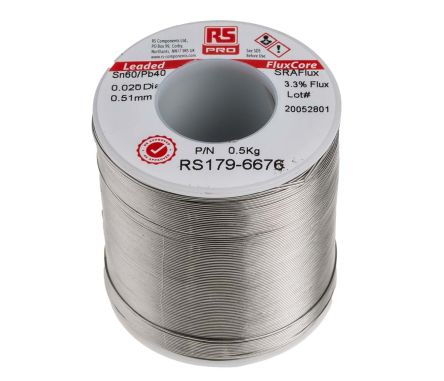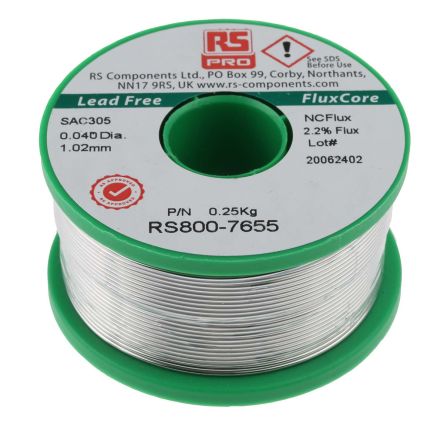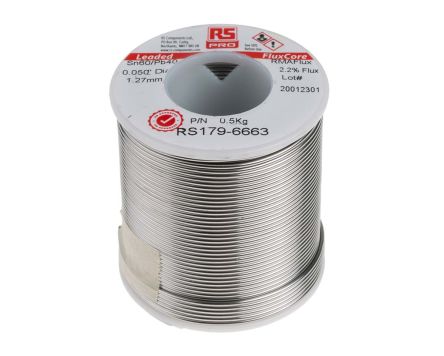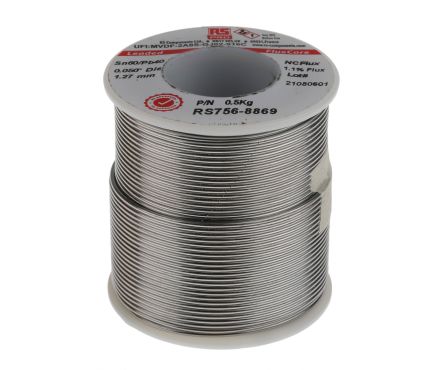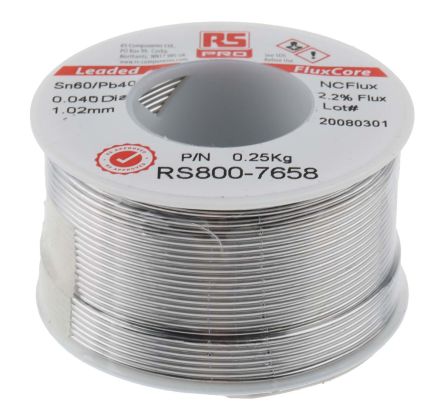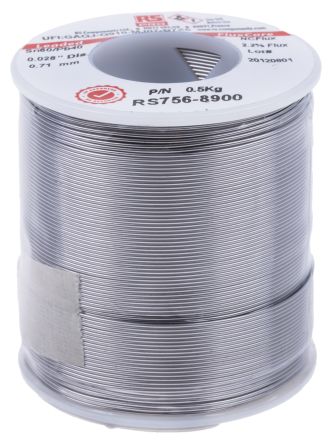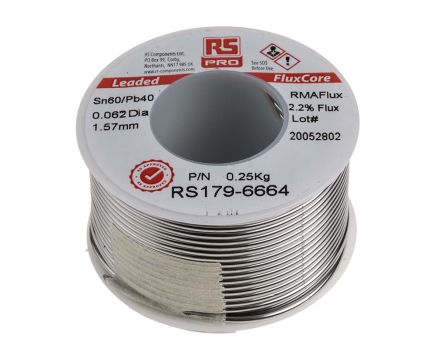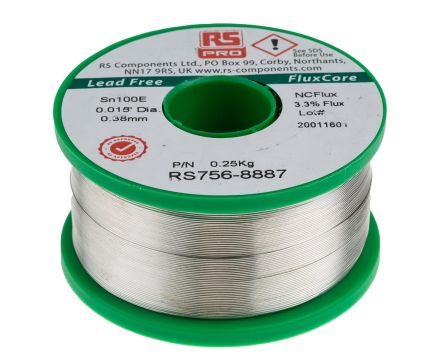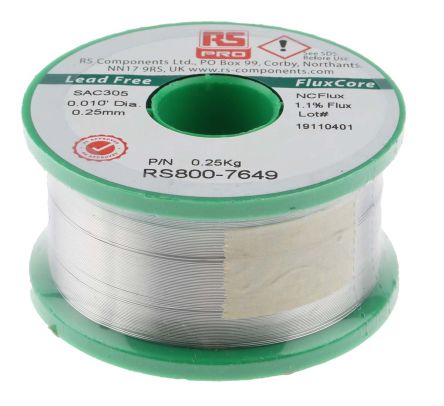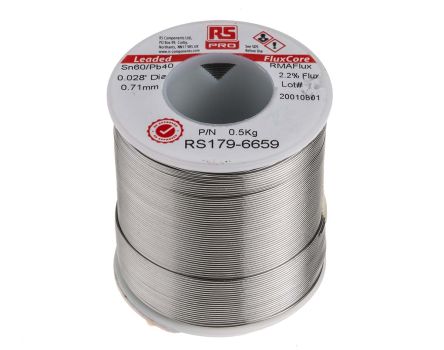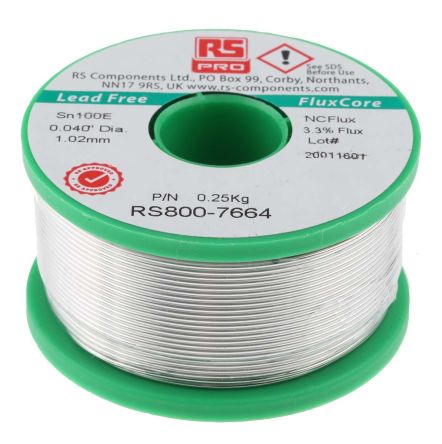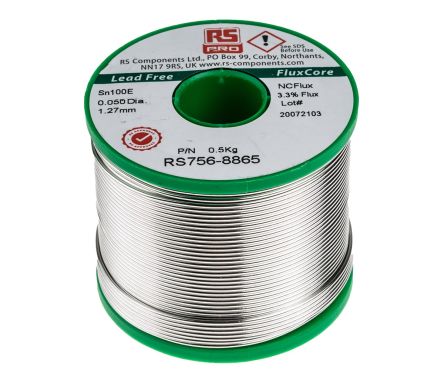- Automation & Control Gear
- Cables & Wires
- Enclosures & Server Racks
- Fuses & Circuit Breakers
- HVAC, Fans & Thermal Management
- Lighting
- Relays & Signal Conditioning
- Switches
- Batteries & Chargers
- Connectors
- Displays & Optoelectronics
- ESD Control, Cleanroom & PCB Prototyping
- Passive Components
- Power Supplies & Transformers
- Raspberry Pi, Arduino, ROCK, STEM Education & Development Tools
- Semiconductors
Solder
Solder, or solder wire, is a fusible metal alloy with a low melting point used to create permanent joints between two metals with higher melting points. This process, known as soldering, is widely used in various industries, including electronics, jewellery making, and plumbing.
Soldering is typically carried out using soldering irons, which provide the necessary heat to melt the solder and create a strong bond between the metals. For more detailed guidance on the soldering process and techniques, read our comprehensive guide on how to solder.
Benefits of Using Solders
Electrical Conductivity
Solders provide excellent electrical conductivity, ensuring efficient current flow in electrical and electronic circuits. This is crucial for the proper functioning of electronic devices and systems. For example, solders are used to connect components on a circuit board, ensuring reliable electrical pathways.
Mechanical Strength
Solders create strong mechanical bonds between metals, providing structural integrity and ensuring the longevity of soldered joints. This is important in applications where the joint may be subjected to stress or vibration, such as in automotive or aerospace assemblies.
Heat Resistance
Due to their ability to withstand elevated temperatures without significant degradation, solders are ideal in applications where heat is a factor. For instance, they are used in high-temperature electronics and automotive components that operate under elevated temperatures.
Corrosion Resistance
In application environments like plumbing and outdoor electronics, exposure to moisture or harsh chemicals may be a concern. As such, solders provide some measure of protection to metal joints with their corrosion-resistant properties.
Versatility
Solders are available in various alloys and forms, offering versatility for different applications and soldering techniques. This allows for the selection of solder wires with specific melting points, mechanical properties, and other characteristics to suit the needs of the application.
Repairability
Joints that have been soldered can easily be repaired or reworked if needed, providing flexibility for modifications. This is particularly useful in electronics, where components may need to be replaced or circuits modified.
Features of Solder Wires
Melting Point
The melting point of a solder wire refers to the temperature at which it transitions from a solid to a liquid state. This is a crucial characteristic, as it determines the appropriate soldering temperature and affects the soldering process.
Flux Core
Many solder wires have a flux core, which is a chemical agent that helps to clean the surfaces being soldered and promotes the flow of solder. The flux core can be rosin-based, acid-based, or water-soluble. Rosin core solder is commonly used in electronics, while acid-based fluxes are used in plumbing and metalwork.
Alloy Composition
The alloy composition of a soldering wire refers to the specific metals and their proportions used in the alloy. Different alloy compositions offer different properties, such as melting point, tensile strength, and wetting characteristics.
Solderability
Solderability refers to the ease with which a solder wire wets and adheres to the surfaces being soldered. Good solderability is essential for creating strong and reliable solder joints.
Joint Strength
Joint strength refers to the mechanical strength of the soldered connection. It is influenced by factors such as the solder alloy used, the soldering technique, and the cleanliness of the surfaces being joined.
Types of Solders
There are various types of solders available to meet different application requirements.
Solder Wire
Soldering wire is the most common form of solder. It is available in a range of diameters (from 0.23mm to 7mm) to suit different soldering applications. For instance, thinner solder wire is used for delicate electronics work, while thicker wire is used for heavier-duty applications.
Solder Paste
Solder paste is a mixture of solder powder, flux, and other additives in a paste form. It is ideal for use in printed circuit boards (PCBs) and connecting surface mount electronic components. Solder paste is typically applied using stencils or dispensing equipment and then reflowed in a controlled heating process to create solder joints.
Solder Preforms
Solder preforms are pre-shaped solder pieces designed for specific applications. They are often used in high-volume production or when precise solder placement is required.
Solder Bar
Solder bars are solid forms of solder alloy that can be melted easily and spread across large areas. They are used for larger soldering jobs or when a significant amount of solder is needed, such as in industrial soldering processes or for repairing large metal components.
Solder Tape
These thin strips of solder alloy are often used to bind parts together while soldering. Solder tape is typically supplied in rolls and can be easily cut to the desired length.
Solder Materials
Solders can be broadly categorised as lead-free and lead-based, each offering different benefits and properties for various applications.
Tin is a key material in both lead-free and lead-based solders. Available in various concentrations (from 5% to 70%), it provides different degrees of tensile strength to the solder.
Lead-Based Solder
Tin-Lead Solder
Tin-lead solder is a traditional solder alloy that offers excellent solderability and joint strength. However, due to the health and environmental concerns associated with lead, its use is restricted in many applications, particularly in electronics.
Lead-Free Solder
Tin-Silver-Copper (SnAgCu)
Tin-silver-copper solder wire is a widely used lead-free option known for its excellent soldering characteristics and mechanical properties. It offers good wetting, strong joint strength, and high reliability, making it suitable for a wide range of electronic applications, including surface mount technology (SMT) and through-hole soldering.
Tin-Silver (SnAg)
Because of its mechanical strength and good electrical conductivity, tin-silver solder is often preferred for applications in which the integrity of the solder joint is critical, such as aerospace and medical devices. Tin-silver solder offers good solderability and forms strong bonds, ensuring long-term performance and resistance to thermal cycling and vibration.
Bismuth-Based Solder
Bismuth-based solder offers a lower melting point than tin-silver-copper or tin-silver solders. It is suitable for soldering temperature-sensitive components or when rework is frequently required. For example, they are used in delicate sensors like fire detection systems.
What is Flux?
Flux is a chemical cleaning agent used in soldering to remove oxides and other contaminants from the surfaces being soldered. It also helps to prevent oxidation during the soldering process, ensuring a strong electrical connection and high mechanical strength.
Soldering wires contain a flux core, which can be made of different materials.
- Rosin Flux: Rosin flux is a common type of flux used in electronics soldering. Rosin-core or rosin-based solders offer good cleaning action and leave minimal residue after soldering.
- Acid Flux: Acid flux is a stronger type of flux used for soldering metals like copper and brass. It is not suitable for electronics, as it can cause corrosion. Instead, it is commonly applied in plumbing and metal mending.
- Water Soluble Flux: Water soluble flux is a type of flux that can be easily cleaned with water after soldering, ideal for uses in which cleanliness is critical.
Solder Applications
Electronics Industry
Solders are essential in the electronics industry for assembling and repairing electronic devices and circuits.
- Circuit Board Assembly: Solders are used to connect electronic components to printed circuit boards (PCBs), creating the intricate circuitry that forms the foundation of electronic devices.
- Component Repair: Solders help repair or replace damaged components on PCBs, restoring functionality to electronic devices.
Automotive Industry
The automotive industry relies on solders for various electrical and electronic connections.
- Wiring Harnesses: Solders help create reliable connections in wiring harnesses, ensuring the proper functioning of electrical systems in vehicles.
- Sensor and Actuator Connections: These essential components in modern vehicles require soldered connections in order to effectively monitor and control various systems.
Telecommunications Industry
Solders are also a mainstay in the telecommunications industry:
- Circuit Board Assembly: The components on circuit boards in telecommunications equipment, such as routers, switches, and base stations, are connected by solders.
- Cable Assembly: Soldering helps to terminate and connect coaxial cables and other types of cables in telecommunications infrastructure.
Aerospace Industry
In the aerospace industry, critical electronic and electrical connections in aircraft and spacecraft require soldering.
- Circuit Board Assembly: Components on circuit boards in aerospace systems are connected through soldering to ensure reliable performance in demanding conditions.
- Wiring Harnesses: Solders create strong and reliable connections in wiring harnesses for aircraft and spacecraft, ensuring the integrity of critical electrical systems.
Buy Solders from RS Singapore
If you're looking for a reliable solder supplier, look no further than RS Singapore. We source our products, including solders, from leading brands like MBO, Weller, and Multicore, ensuring that your items are of the best quality possible.
With our selection of solders with various wire diameters and lead content, you're sure to find the perfect item for your needs. Additionally, we stock a range of mechanical hardware and tools, from long nose pliers to Jubilee clamps, so you can browse our online site to find the products you need at one go.
Explore our flexible delivery options, such as express and next-day delivery, to find out how you can receive your goods at your convenience. For more information on shipping options, please read our delivery information page.
